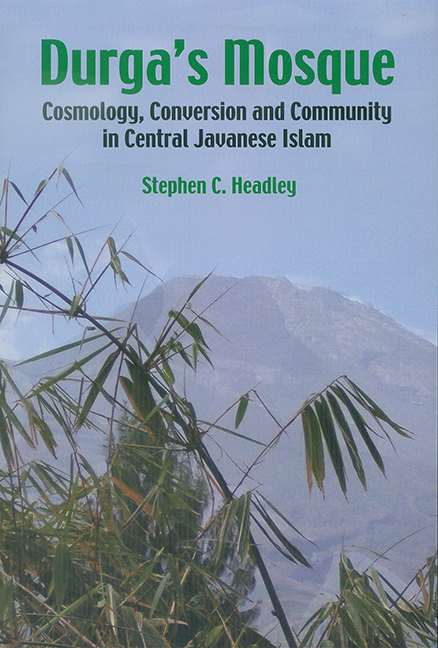Book contents
- Frontmatter
- Contents
- List of Figures
- List of Tables
- Preface
- Acknowledgements
- Introduction: Cosmology, Conversion and Community in Javanese Islam
- PART I THE SOCIOLOGY AND PRACTICE OF RELIGION IN CENTRAL JAVA
- PART II RECONSTRUCTION OF LOCAL RELIGIOUS HISTORY
- PART III INVOKING THE COSMOS, MAGNIFYING ALLAH: STRUCTURING A LANDSCAPE IN THE SEVENTEENTH TO NINETEENTH CENTURIES
- 7 The Khandava Forest in India and Its Javanese Demon Queen
- 8 The Spearing of Durga's Buffalo
- 9 Invoking the Goddess Durga; Worshipping Allah
- 10 The Javanization of Islamic Prayer; The Islamization of Javanese Prayer
- 11 Javanese Cosmologies and Muslim Cosmographies: An Encompassing Knowledge?
- PART IV COSMOLOGY, CONVERSION AND COMMUNITY IN CENTRAL JAVANESE ISLAM TODAY
- Bibliography
- Index
- About the Author
11 - Javanese Cosmologies and Muslim Cosmographies: An Encompassing Knowledge?
from PART III - INVOKING THE COSMOS, MAGNIFYING ALLAH: STRUCTURING A LANDSCAPE IN THE SEVENTEENTH TO NINETEENTH CENTURIES
Published online by Cambridge University Press: 21 October 2015
- Frontmatter
- Contents
- List of Figures
- List of Tables
- Preface
- Acknowledgements
- Introduction: Cosmology, Conversion and Community in Javanese Islam
- PART I THE SOCIOLOGY AND PRACTICE OF RELIGION IN CENTRAL JAVA
- PART II RECONSTRUCTION OF LOCAL RELIGIOUS HISTORY
- PART III INVOKING THE COSMOS, MAGNIFYING ALLAH: STRUCTURING A LANDSCAPE IN THE SEVENTEENTH TO NINETEENTH CENTURIES
- 7 The Khandava Forest in India and Its Javanese Demon Queen
- 8 The Spearing of Durga's Buffalo
- 9 Invoking the Goddess Durga; Worshipping Allah
- 10 The Javanization of Islamic Prayer; The Islamization of Javanese Prayer
- 11 Javanese Cosmologies and Muslim Cosmographies: An Encompassing Knowledge?
- PART IV COSMOLOGY, CONVERSION AND COMMUNITY IN CENTRAL JAVANESE ISLAM TODAY
- Bibliography
- Index
- About the Author
Summary
INTRODUCTION: EXPLORING THE JAVANESE MANIKMAYA
Cosmography usually designates descriptive astronomy. Here the term is used to designate the Muslim notion of the progressive emanation of the universe from Allah's fiat described in Chapter 10 as opposed to Javanese conceptions of the genesis of the cosmos and the gods designated by the term cosmogony. Since at least the sixteenth century Javanese genesis narratives have been retold in mantras and in compilations of myths. Beginning in the middle of the eighteenth century numerous collections were entitled Manikmaya (Made of Jewels). These constitute a new mythological landscape resulting from the new spiritual geography of the island. What is meant by “jewels” may be Guru's fallen seed from which the world is constructed. In later versions, it was from this seed that appeared Guru's monstrous son Kala and the rice parasites. The usual Javanese formula which introduces a cosmology is “when the void still existed and there was neither heaven or earth”. This signals either portions of these Javanese creation myths or, from the eighteenth century onwards, emanations from Allah's divine fiat.
These longer eighteenth century Manikmaya poems began to incorporate Muslim cosmographies by “weaving” them around the narrative of which the Birth of Kala (“fallen seed”) myth was the coda. Episodes from these related Javanese myths include: the fall of Guru's “jewel” (manik), the death of a Sri, a beautiful maiden who appears from a jewel box, and the creation of the first rice fields attacked by Kala's animal army led by Puthut Jantaka. In this chapter I will concentrate on the persistence of the Javanese cosmogonies, giving the relevant history of existing scholarship, description of recensions with quotes, and their analysis. These narratives combine several successive origin myths into one long tale. Under the influence of the Pasisir (Javanese north coast) Kandha, Book of Tales traditions, these Manikmaya then go on to tell the “history” of the Javanese world down to Jaka Tingkir and the realm of Pengging (late fifteenth century). The fallen seed episode is the best remembered from these cosmogonies because of its purification/exorcism (ruwatan) rituals. These texts clarify the links which existed in the minds of the Javanese compilers of mythology between the myth of creation, the myth of the origin of rice and the myth of Kala hunting down humans with bad destinies (sukerta).
- Type
- Chapter
- Information
- Durga's MosqueCosmology, Conversion and Community in Central Javanese Islam, pp. 400 - 422Publisher: ISEAS–Yusof Ishak InstitutePrint publication year: 2004



